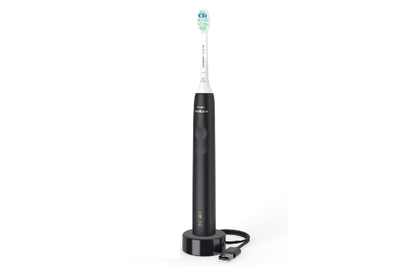If you know true exhaustion, you know how burdensome brushing your teeth can be.
It’s not that it’s the most difficult part of the nighttime routine. (For me, that’s applying all the unctuous goos my eczema-prone flesh demands.) But brushing your teeth is tedious.
It requires focus, plus repetitive wrist and arm movement. It requires self-awareness to track how long you’ve been at it, whether you’ve reached every tooth, whether you’ve reached every tooth sufficiently. It requires spitting into a sink.
And you must do it at least twice a day, every day, until the day that you die.
The Philips Sonicare 4100 will not free you from the shackles of corporeal conservation. But it will make this one element of that duty just a bit easier.
Runner-up
The Philips Sonicare 4100 is to a manual toothbrush what a robot vacuum is to a corn-straw broom: Both will get the job done, but one requires far less effort. My colleagues at Wirecutter have tested more than 60 electric toothbrushes and researched many more over the years, and they know that in motor strength, operating volume, price, and warranty, the Sonicare 4100 ranks highest.
As someone who has owned one for three years, I can verify that it’s powerful without being aggressive, and it’s quiet enough not to wake a sleeping partner.
But what I like most about the Sonicare 4100 is how exceedingly obvious it is to use, an especially important quality for any device operated early in the morning and late at night, when my brain is at its most Cocoa Puffs–like.
You can run the Sonicare 4100 on either of just two vibration settings: high or higher. Some people would argue that this is not enough customization, but in a world overabundant in choice, I consider the limitation a gift.
The toothbrush vibrates for exactly two minutes, vibrating a bit differently every 30 seconds to alert you that it’s time to switch quadrants—again sparing you the burden of attention, so you can focus instead on your podcast, your music, or in my case, the little fugue state brought on by the anxiety of the day. When you are done with your ADA-recommended toothbrushing time, it just shuts off. Simple. Beautiful.

Maintenance is super easy and, honestly, sort of ignorable. Replacing the brush head of the Sonicare 4100 is as mindless as using it: You literally just yank the old head off and push on the new one. You’re supposed to do this every three months, but I can never keep track of where the time goes, so I probably don’t replace them that often. That’s a gross admission, but I’m not perfect.
To be honest, though, if you were to break into my apartment (please don’t) and pull my toothbrush from the medicine cabinet, you wouldn’t even notice that I’d gone past the three-month recommendation anyway, because the brushes hold up fine, with no fraying or staining (though, again, please replace them more regularly than I do).
The stand charger has a small footprint, but I keep it shoved in a drawer because the device needs to be charged only about every two weeks, and it warns you when it’s due with an indicator light. This also makes it great for travel, since you can just toss the toothbrush in your bag and leave the charger at home (so long as you return in less than two weeks).
When I use my Sonicare 4100, I’m aware that it is just one of so many developments that mark this period as the golden age of dental care. Fluoride swirls in the water, and Colgate sells bubble-fruit-flavored unicorn toothpaste for kids who don’t respond well to spearmint.
All of those things together have shaped a world in which people can fully expect, with a bit of good luck, to keep all the bones in their mouths forever. It’s a marvel, but it’s also a burden. When I imagine how many cumulative hours I will spend toiling in this duty—brushing, flossing, listening to the dentist say I don’t floss enough—I admit, I am daunted.
But this body of mine is forever, as long as my forever lasts. If the natural order of the human body is to wrinkle, rot, and decay (and it is), then to brush your teeth is to try to stop the inevitable, or at least to slow it down. It is, in essence, a fight against nature, against mortality itself. It is impossible, of course, to win, but I’m grateful for the challenge—and I’m grateful that I have a tool in the fight.
This article was edited by Maxine Builder and Catherine Kast.




